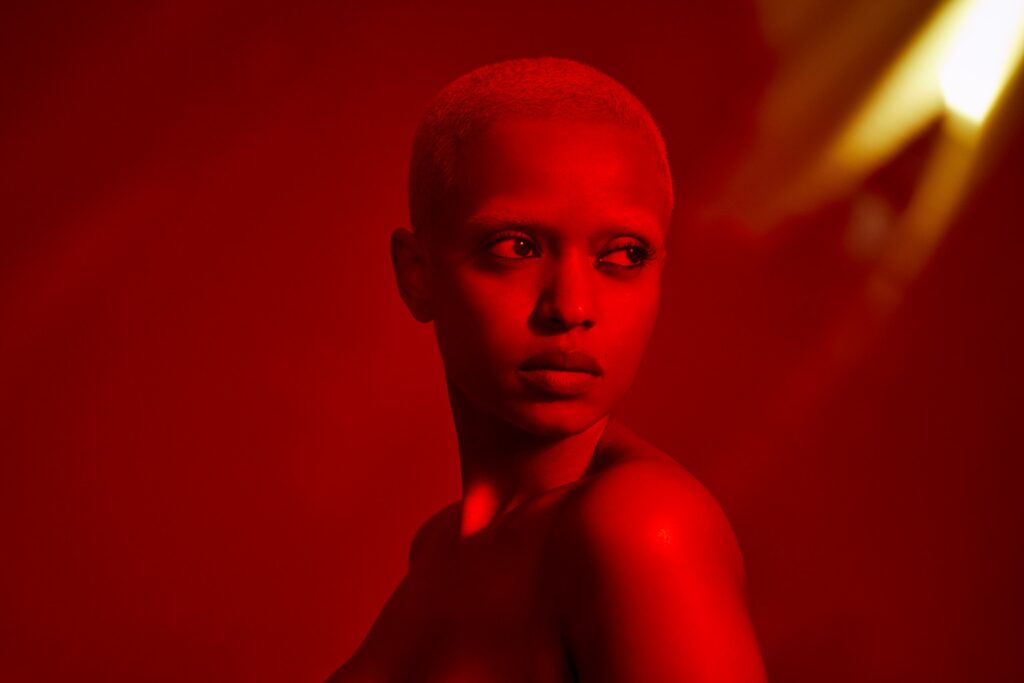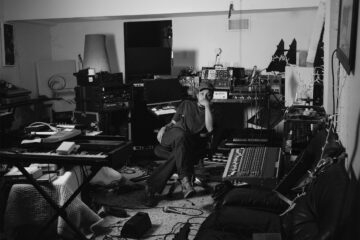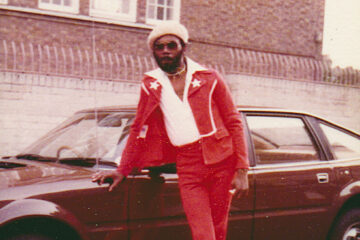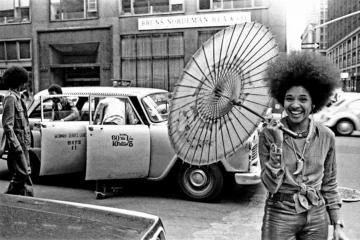It crackles in the zoom call, Kelela appears… not. The camera of the American artist stays off. But she has time – to talk about »Raven«, the first album since her breakthrough in 2017. And Kelela has a lot of catching up to do. For several years she was offline. No social media, hardly any appearances. Instead, quality time: she read books by Black women authors, listened to podcasts about whiteness and watched documentaries like »The Last Angel of History«. The crash course in Black Theory is finished for the time being. She won’t need another online hiatus any time soon, says Kelela.
You had been away for some time!
Kelela: During the last couple years I did a lot of internal work besides working on this actual record. I am not a conceptional artist, I don’t know what a project is about before I start it. It’s more like: »Do you have any instrumentals? Put them in a folder and I improvise over that.« That’s probably a very basic, but inherently straight-forward approach. Therefore, I look at what I did after I finish writing. At this point, I get to learn about myself and what it is that I am feeling.
That’s interesting. In a way you reflect the reflection.
Totally. I feel grateful to have this thing that I can do with myself which is like self-discovery. It helps me to understand where I am going in my llife. Obviously, I can articulate that feeling on some level with words. Sometimes, though, I find out what might be bothering me in a way that I didn’t think it was bothering me because I thought I already dealt with it.
This sounds like you had to question yourself in the process. Have you found any answers?
I didn’t really pose a question to myself, so it’s hard to describe it as finding an answer. However, I’ve definitely discovered a lot of things about myself—not only through writing the actual songs, but also during the time I’d been off the internet.
You went silent for a few years, right.
If you don’t post on the internet, it’s literally like you die.
You stop existing.
Yeah, that’s why people interpreted way bigger of a statement than I actual had in mind. I just didn’t want to be on the internet because I needed to to other stuff in my life. Of course, I could have been posting from time to time, being cute over here, wearing the outfit over there — and people wouldn’t be like: »What have you been doing this whole time!« Thing is: I did what I normally do at any other time in terms of doing research, trying to read about my reality and having discussions with my peers to get to the bottom of dynamics that other artists are afraid to name.
»I had to be willing to let go of something and take a risk.«
Kelela
Could you elaborate on that?
There are things that we as Black people experience. There are other things that I experience as a Black femme—and there are things that I experience as a queer Black femme artist. Something I discussed with a friend recently was: Normally, you surround yourself with people that share the same taste. We have been interpreting it as the same values, but we actually don’t have the same values. We just like the same looks and aesthetics — that’s a big distinction.
I am really happy that you mention the different layers of intersectionality. It’s a blind spot for a lot of people including me sometimes. It’s good to shine a light on it.
You know, as soon as some people come to this conclusions, they start getting righteous and be like: »Nobody else is talking about it!« Actually, I don’t feel that way because I know how scary it is for so many people. We don’t have security in dance and experimental music unless white guys approve of what we do. Only then, we get resources and money to pay our rent and be an artist. That’s the difference between security and not feeling secure. People feel like they can’t afford to piss these people off. Because if they are to say something, they are going to fuck their security.
You did cut some ties in the industry…
I’d say that I drew some boundaries.

No matter how you put it, there’s a privilege bound to doing that, isn’t?
Exactly! I don’t feel threatened, still, there is an underlying feeling that if I talk my shit too much, they will pull the fucking plug. So, I have to make strategic moves. While I am talking my shit I have to participate in ways to create a balance. I can’t say: »Fuck the whole thing!« At the end of the day, I still have to operate and make a living. Sometimes, though, things need to be said and boundaries need to be drawn, no matter what. That’s the place where I am in now. That’s the difference between »Take Me Apart« and »Raven«—drawing the boundaries is like a staple.
Was there a specific moment when you realized that you have to draw these boundaries?
The majority of tracks were born within six days at the beginning of 2020. By April, I had all of the lyrics, in that moment I knew that I was going to share it with the world. When I thought about going to my label, I knew that I couldn’t do it the same way as last time because: They need to do their homework. I can’t give these guys a lecture at the beginning of the album rollout. There are ways that I have to advocate myself on a business level to get the resources I need to do what I wanna do. If I have to battle at every turn that I am involved in, I am always told that it is not as viable as I think it is.
That’s because of…
Colourism, of course. You can be light-skinned and on an indie label and have some success. You can be dark-skinned on a major label, but in order to fight colourism, you’d need hundreds of thousands of dollars to create visibility. No matter how bomb the work is that I make, it won’t see the light of the day unless that happens. My worth is a conversation that I have to keep reminding everybody about my work—something that can wear on your emotional health and your physical well-being.
Absolutely, that’s what I meant about cutting ties. You drew your boundaries because you learned something about yourself and adopted accordingly.
Adopting, that is the term I want to use, yes. It’s physically impossible to cut ties with white guys in positions of power. I can’t even get close to that term because it would literally cut up my whole life up. Therefore I have to use words like adapting or transforming—making sure that my boundaries are clear so that we can work in a different type of dynamic. It required a break at some sort because I had to be willing to let go of something and take a risk.
»And you know what? It’s all Black music too!«
Kelela
Have you always found it easy to let go?
Not at all. At the beginning of my career, there wasn’t any physical security or emotional romantic. I have found renewal in different points in my life since because of lessons I learned from this dark period of time. I’m talking about risk-taking and the longtime reward that comes from that over the value in an immediately gratifying pursuit. This lessons have instilled a faith in me. Now I know, that I rather spend my time getting real than just being present.
You don’t pretend to be there unless you really are there.
Yeah, nowadays it has to look like you’re being present even if you’re not fully participatory. The reality is: We need more than that! Because I took my time and did the work, I don’t think that I need a break like this ever again. I have reached a place where the pipe is clear and it’s flowing in a way that it did not before.
This kinda connects to the record. »Raven« is restrained, but it knows exactly where it aims for: the dancefloor, even if the Detroit Techno references are washed out textures like on »Washed Away«.
I was trying to show people that this sort of thing as we refer to as ambient and literally every sub-genre of dance music is connected and related. That’s also why I wanted to mix all the tracks together as if I was djing. It allows for a point of discovery and to understand the relationship between things. Ethereal pads can be related to happy endings.
There is so much past euphoria connected to these four chords.
OCA (Yo Van Lenz and artist Florian T M Zeisig) asked me if we could add something to the track because the chords are so basic and straight-forward, but I was like: No! This loop is perfect, it could go on forever! It’s an infinite land, that’s where I come from. If you listen closely to the pad, you can also hear that there are many layers to it which trigger all these other sounds. I don’t want to ignore or devalue them. When you come from thinking about the critic of cis white guys in dance music who are judging everything, it can make you believe that things have to be more complex and heavier than they have to be. I didn’t want to make it heavy because it already felt good.
There is a trend to make music heavy…
And hard! The rigidity is being valued in dance music right now—and that’s ok if we could all find a way to find many things valuable at the same time. I made this record in direct response to that adherence. See, a lot of people are like: »I only make this type of music!« and I’m like: »Fuck your little type cause I make that type and this type and you know what? It’s all Black music too!«
You said before that the record is like a medley. This makes total sense in that way. You show off the abundance of Black music!
Absolutely! I want to dismantle…
…the ignorance of so many white people, right? We all have to not only respect the roots, but also know about them in the first place.
Most of the time the buck stops at just saying that Black people had something to do with inventing dance music. That’s like naming Black people as a flex which is meant to elevate your own profile. In reality, you are not doing anything about the injustice! Recently, a friend of mine was invited to a music festival in Belgium where they did a panel about Black people in dance music. They were asked why they thought the scene is so white. I’m like: »Where is the panel where we talk about white privilege and patriarchy?« I get that people try to invest in Black people, but the reality is: In order to dismantle this thing, we need them to lead that conversation!
It’s like: If I am not joining the struggle to dismantle a system that advantages me, I am complicit.
Exactly, in that case just get out of here and put Ableton away!
I’m pretty sure you are familiar with DeForrest Brown Jr. He put out a bible concerning the history of black dance music.
It’s a bible and I’m pumped to read it. I know DeForrest for quite some time. We’ve had many discussions. Once, I asked him: »Who is bigger than me in dance music that would be down to stand in solidarity?« He was like: »You’re the only one this big who’d use their voice to talk about these topics.« That’s the reality. Therefore I love his ethos because it has created so much intellectual safety for me.
It’s something you can use as a reference, right?
The written white narrative is so much different than the Black word-of-mouth narrative. There may have been a Black person involved in the beginning of that label or that scene, but that’s mostly something you hear by word of mouth. The history that is written in many books is not getting the whole picture. DeForrest Brown changes that!
I love how you frame it. There’s no excuse for not knowing. You only didn’t do your homework then.
Right, it’s all there because somebody did the historian work.
I feel like we can call it here, but before we stop: Do you mind sharing something you love about yourself?
Well… That I do this the way I do it! Of course, some people see the value in it. Systemically though, most of the people don’t give a shit about me. Therefore, I love that I am facing it with tenderness while also drawing boundaries. Also, I am proud of myself for having done the internal work that gives me the capacity to deal with it.
That’s great.
You know what I love about myself too? I have really great toes! Probably the best looking toes! It’s striking!










